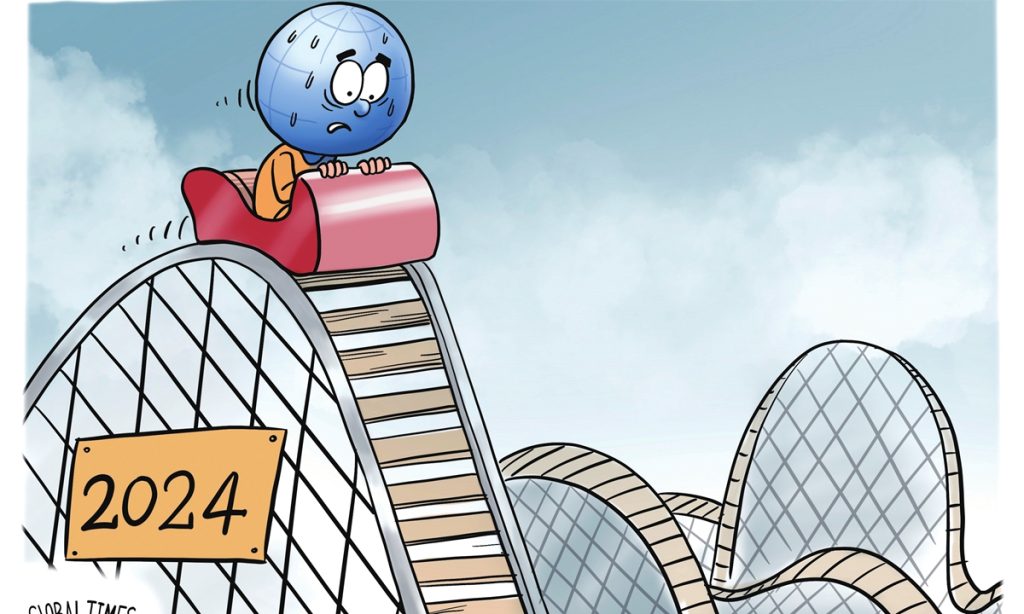Based on historical inertia, how will international relations develop?

Editor's Note:
As the year 2024 has just begun, how the world will develop this year and in the near future has captured the attention of people around the globe. At the "International Relations Forecast - Re-exploring the Inertia of History" conference held on Saturday in Beijing, organized by the Institute of International Relations at Tsinghua University, over 10 international relations experts shared their views on the prediction of future international relations between China, the US and other major countries and regions. This is the excerpt of the opinions of four scholars.
Yan Xuetong, dean of the Institute of International Relations at Tsinghua University:
Future forecasts of international relations should particularly consider the increasing trend of populism, especially in Western countries that proclaim liberalism. Over the past decade, the US has led the way in undermining liberalism, engaging in economic "decoupling," and disrupting the international norms established after the Cold War. Populism will have a mainstream impact on the foreign policies of major countries, with some European nations already beginning to follow this trend.
With the mainstream dominance of populism, the influence of constructivism and liberalism on international behavior is expected to decline significantly. Analyzing from a realist perspective, there will be an increasing trend of international cooperation turning into confrontation. It will become increasingly challenging for the world economy to develop positively, and the cooperation between China and the US in trade and economics may not see a continuous upward trend.
Furthermore, the current competition is shifting toward the area of technology. In future strategic competitions, not only between China and the US but also between China and Japan, China and Europe, and the US and Europe, the core focus will be on technology rather than ideology. Subsequently, national competition strategies will undergo changes, and in our predictions for the next 10 years, we must pay more attention to the impact of advancements in digital technology.
Diao Daming, professor at the School of International Studies at Renmin University of China:
I believe that, regardless of the results of the 2024 US presidential election, the US will not change its strategic position in competition with China, and the strategic game between China and the US will persist.
The US is expected to have mediocre economic performance in the next 10 years, accompanied by escalating domestic contradictions. By the 2040s, the demographic structure of the US will undergo a significant transformation into a state without a majority ethnic group, leading to the complete abandonment of the national creed of uniting the nation. This will usher in a prolonged adjustment phase.
Additionally, China's total economic output is projected to surpass that of the US before 2050, and the two countries will enter an intersecting phase in terms of data significance. After 2028, it is anticipated that China and the US will eventually enter a stage of stalemate, where cooperation and competition become the norm. The world will not witness a bipolar state. Instead, different power structures will emerge in different fields and on different issues.
Sun Chenghao, fellow at the Center for International Security and Strategy at Tsinghua University:
If the Republican Party is in power, the US will adjust the focus of its competition with China. While emphasizing domestic demand, it will intensify the portrayal of the so-called China threat, combining internal difficulties in the US with competition against China.
The Republicans may extend their reach into issues such as education, crime and technology, and the economic momentum toward "de-risk" may shift back toward "decoupling."
Second, the Republicans will differentiate themselves by adopting a tough stance. They may add new points of risk game against China, and extreme policy options against China could be used to appease right-wing conservatives internally.
Third, the continuity of communication channels between China and the US will face uncertainties. Cooperation between China and the US may find it difficult to gain more impetus at the federal level, and the positive forces of communication may sink more to the local and civilian levels.
She Gangzheng, associate professor in the Department of International Relations at Tsinghua University:
I personally believe that the behaviors of smaller countries, including those in the Middle East, will be significantly influenced by the competition among major powers. However, in the context of the technological competition in this digital age, the actions of these smaller countries will, in turn, serve as a strategic hedge, influencing and constraining major powers.
In the future, even if there is a considerable power disparity between countries, it may not necessarily translate into a corresponding disparity in terms of power. The mainstream viewpoint currently suggests that as the pressure from the competition between China and the US intensifies, the pressure on smaller countries to take sides will also increase, and their room for choice will diminish. However, I believe this follows a cold war logic and not the logic of the digital age. In the future, the space for these smaller countries to take sides may remain unchanged or even expand.